US vs. Lichtenberger: Case Brief on Warrantless Electronic Searches
VerifiedAdded on 2022/08/11
|6
|1170
|23
Case Study
AI Summary
This case brief examines the United States vs. Lichtenberger case, focusing on the Sixth Circuit Court's decision regarding warrantless searches of electronic devices. The case involved Lichtenberger, who was arrested based on information discovered on his password-protected laptop by his girlfriend. The court considered whether the police officer's search of the laptop exceeded the scope of a prior private search, ultimately ruling that it did and was therefore unconstitutional. The analysis highlights the unique challenges electronic devices pose to traditional private search jurisprudence and advocates for a 'particularity method' to protect digital privacy rights. The brief references relevant cases, including United States vs. Jacobsen and United States vs. Tosti, to support its arguments and underscores the need for courts to adopt this method to prevent unreasonable government invasions of privacy.
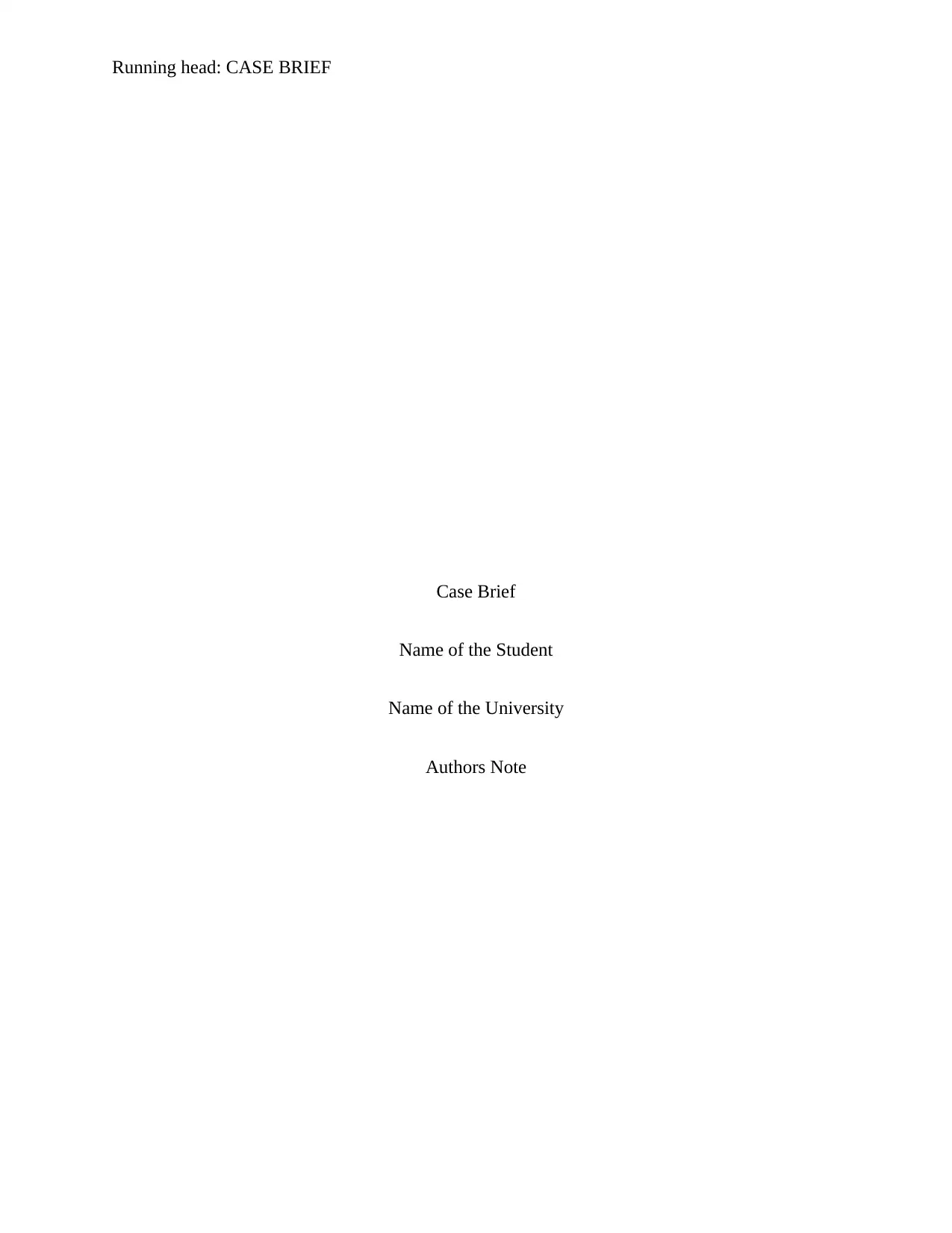
Running head: CASE BRIEF
Case Brief
Name of the Student
Name of the University
Authors Note
Case Brief
Name of the Student
Name of the University
Authors Note
Paraphrase This Document
Need a fresh take? Get an instant paraphrase of this document with our AI Paraphraser
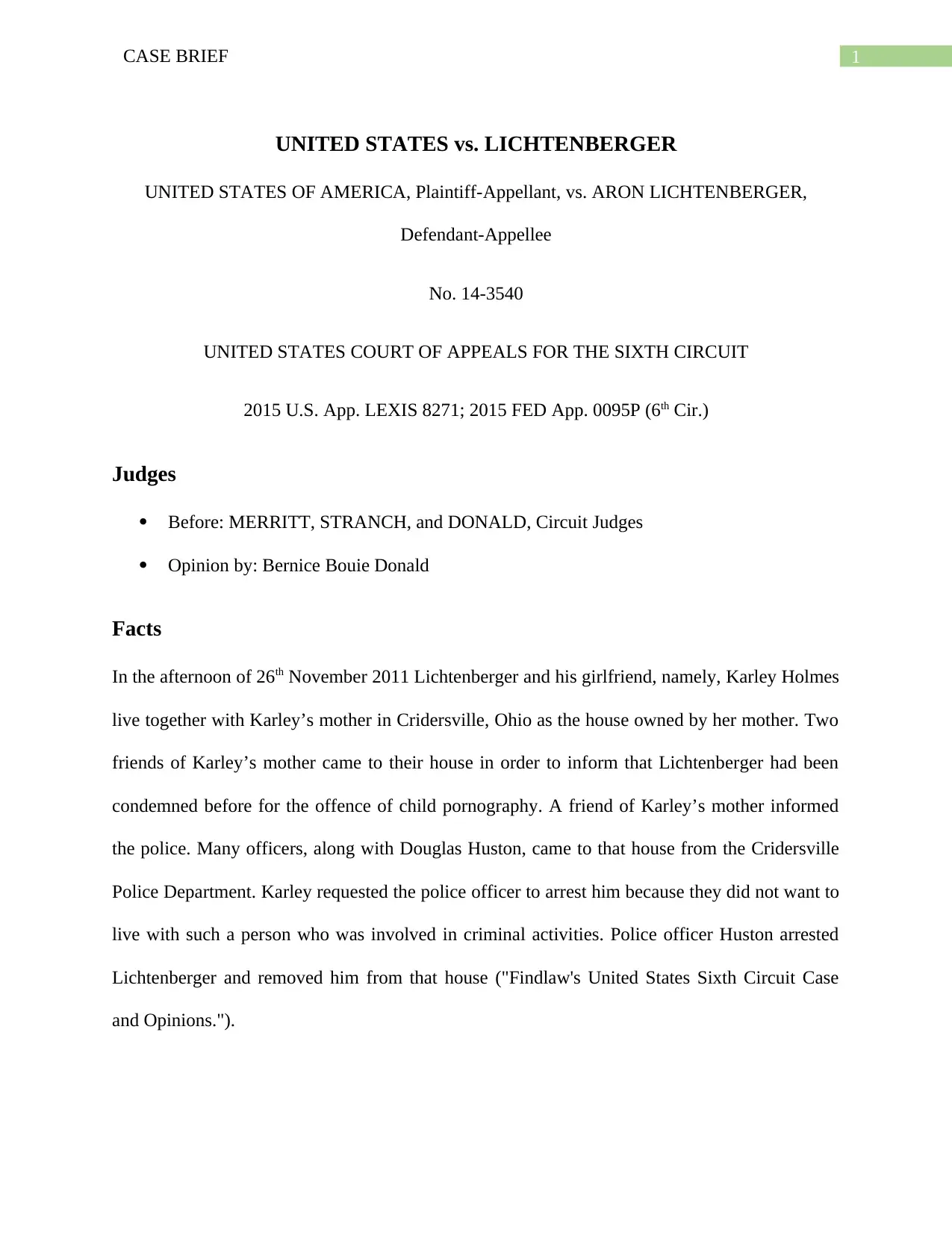
1CASE BRIEF
UNITED STATES vs. LICHTENBERGER
UNITED STATES OF AMERICA, Plaintiff-Appellant, vs. ARON LICHTENBERGER,
Defendant-Appellee
No. 14-3540
UNITED STATES COURT OF APPEALS FOR THE SIXTH CIRCUIT
2015 U.S. App. LEXIS 8271; 2015 FED App. 0095P (6th Cir.)
Judges
Before: MERRITT, STRANCH, and DONALD, Circuit Judges
Opinion by: Bernice Bouie Donald
Facts
In the afternoon of 26th November 2011 Lichtenberger and his girlfriend, namely, Karley Holmes
live together with Karley’s mother in Cridersville, Ohio as the house owned by her mother. Two
friends of Karley’s mother came to their house in order to inform that Lichtenberger had been
condemned before for the offence of child pornography. A friend of Karley’s mother informed
the police. Many officers, along with Douglas Huston, came to that house from the Cridersville
Police Department. Karley requested the police officer to arrest him because they did not want to
live with such a person who was involved in criminal activities. Police officer Huston arrested
Lichtenberger and removed him from that house ("Findlaw's United States Sixth Circuit Case
and Opinions.").
UNITED STATES vs. LICHTENBERGER
UNITED STATES OF AMERICA, Plaintiff-Appellant, vs. ARON LICHTENBERGER,
Defendant-Appellee
No. 14-3540
UNITED STATES COURT OF APPEALS FOR THE SIXTH CIRCUIT
2015 U.S. App. LEXIS 8271; 2015 FED App. 0095P (6th Cir.)
Judges
Before: MERRITT, STRANCH, and DONALD, Circuit Judges
Opinion by: Bernice Bouie Donald
Facts
In the afternoon of 26th November 2011 Lichtenberger and his girlfriend, namely, Karley Holmes
live together with Karley’s mother in Cridersville, Ohio as the house owned by her mother. Two
friends of Karley’s mother came to their house in order to inform that Lichtenberger had been
condemned before for the offence of child pornography. A friend of Karley’s mother informed
the police. Many officers, along with Douglas Huston, came to that house from the Cridersville
Police Department. Karley requested the police officer to arrest him because they did not want to
live with such a person who was involved in criminal activities. Police officer Huston arrested
Lichtenberger and removed him from that house ("Findlaw's United States Sixth Circuit Case
and Opinions.").
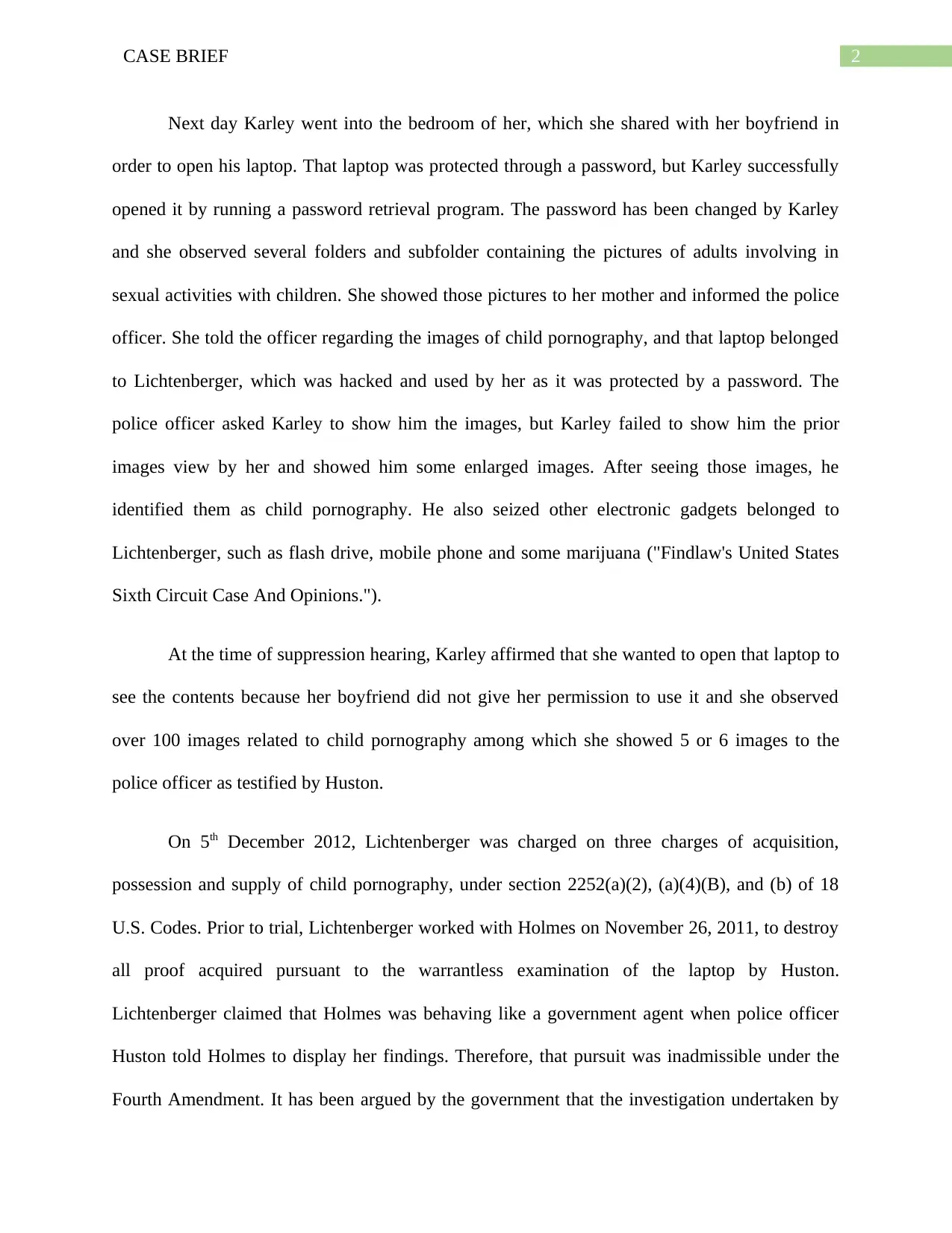
2CASE BRIEF
Next day Karley went into the bedroom of her, which she shared with her boyfriend in
order to open his laptop. That laptop was protected through a password, but Karley successfully
opened it by running a password retrieval program. The password has been changed by Karley
and she observed several folders and subfolder containing the pictures of adults involving in
sexual activities with children. She showed those pictures to her mother and informed the police
officer. She told the officer regarding the images of child pornography, and that laptop belonged
to Lichtenberger, which was hacked and used by her as it was protected by a password. The
police officer asked Karley to show him the images, but Karley failed to show him the prior
images view by her and showed him some enlarged images. After seeing those images, he
identified them as child pornography. He also seized other electronic gadgets belonged to
Lichtenberger, such as flash drive, mobile phone and some marijuana ("Findlaw's United States
Sixth Circuit Case And Opinions.").
At the time of suppression hearing, Karley affirmed that she wanted to open that laptop to
see the contents because her boyfriend did not give her permission to use it and she observed
over 100 images related to child pornography among which she showed 5 or 6 images to the
police officer as testified by Huston.
On 5th December 2012, Lichtenberger was charged on three charges of acquisition,
possession and supply of child pornography, under section 2252(a)(2), (a)(4)(B), and (b) of 18
U.S. Codes. Prior to trial, Lichtenberger worked with Holmes on November 26, 2011, to destroy
all proof acquired pursuant to the warrantless examination of the laptop by Huston.
Lichtenberger claimed that Holmes was behaving like a government agent when police officer
Huston told Holmes to display her findings. Therefore, that pursuit was inadmissible under the
Fourth Amendment. It has been argued by the government that the investigation undertaken by
Next day Karley went into the bedroom of her, which she shared with her boyfriend in
order to open his laptop. That laptop was protected through a password, but Karley successfully
opened it by running a password retrieval program. The password has been changed by Karley
and she observed several folders and subfolder containing the pictures of adults involving in
sexual activities with children. She showed those pictures to her mother and informed the police
officer. She told the officer regarding the images of child pornography, and that laptop belonged
to Lichtenberger, which was hacked and used by her as it was protected by a password. The
police officer asked Karley to show him the images, but Karley failed to show him the prior
images view by her and showed him some enlarged images. After seeing those images, he
identified them as child pornography. He also seized other electronic gadgets belonged to
Lichtenberger, such as flash drive, mobile phone and some marijuana ("Findlaw's United States
Sixth Circuit Case And Opinions.").
At the time of suppression hearing, Karley affirmed that she wanted to open that laptop to
see the contents because her boyfriend did not give her permission to use it and she observed
over 100 images related to child pornography among which she showed 5 or 6 images to the
police officer as testified by Huston.
On 5th December 2012, Lichtenberger was charged on three charges of acquisition,
possession and supply of child pornography, under section 2252(a)(2), (a)(4)(B), and (b) of 18
U.S. Codes. Prior to trial, Lichtenberger worked with Holmes on November 26, 2011, to destroy
all proof acquired pursuant to the warrantless examination of the laptop by Huston.
Lichtenberger claimed that Holmes was behaving like a government agent when police officer
Huston told Holmes to display her findings. Therefore, that pursuit was inadmissible under the
Fourth Amendment. It has been argued by the government that the investigation undertaken by
⊘ This is a preview!⊘
Do you want full access?
Subscribe today to unlock all pages.

Trusted by 1+ million students worldwide
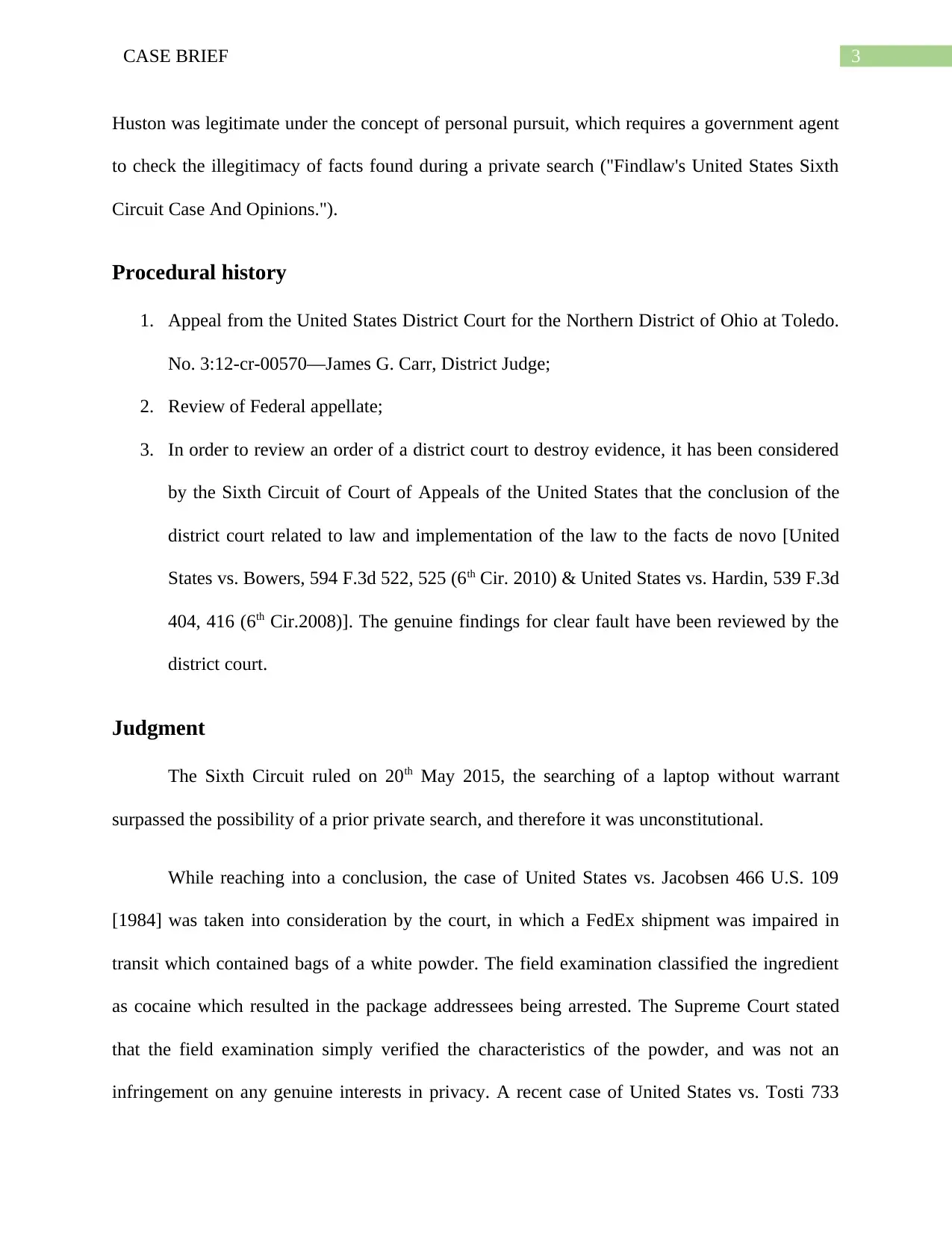
3CASE BRIEF
Huston was legitimate under the concept of personal pursuit, which requires a government agent
to check the illegitimacy of facts found during a private search ("Findlaw's United States Sixth
Circuit Case And Opinions.").
Procedural history
1. Appeal from the United States District Court for the Northern District of Ohio at Toledo.
No. 3:12-cr-00570—James G. Carr, District Judge;
2. Review of Federal appellate;
3. In order to review an order of a district court to destroy evidence, it has been considered
by the Sixth Circuit of Court of Appeals of the United States that the conclusion of the
district court related to law and implementation of the law to the facts de novo [United
States vs. Bowers, 594 F.3d 522, 525 (6th Cir. 2010) & United States vs. Hardin, 539 F.3d
404, 416 (6th Cir.2008)]. The genuine findings for clear fault have been reviewed by the
district court.
Judgment
The Sixth Circuit ruled on 20th May 2015, the searching of a laptop without warrant
surpassed the possibility of a prior private search, and therefore it was unconstitutional.
While reaching into a conclusion, the case of United States vs. Jacobsen 466 U.S. 109
[1984] was taken into consideration by the court, in which a FedEx shipment was impaired in
transit which contained bags of a white powder. The field examination classified the ingredient
as cocaine which resulted in the package addressees being arrested. The Supreme Court stated
that the field examination simply verified the characteristics of the powder, and was not an
infringement on any genuine interests in privacy. A recent case of United States vs. Tosti 733
Huston was legitimate under the concept of personal pursuit, which requires a government agent
to check the illegitimacy of facts found during a private search ("Findlaw's United States Sixth
Circuit Case And Opinions.").
Procedural history
1. Appeal from the United States District Court for the Northern District of Ohio at Toledo.
No. 3:12-cr-00570—James G. Carr, District Judge;
2. Review of Federal appellate;
3. In order to review an order of a district court to destroy evidence, it has been considered
by the Sixth Circuit of Court of Appeals of the United States that the conclusion of the
district court related to law and implementation of the law to the facts de novo [United
States vs. Bowers, 594 F.3d 522, 525 (6th Cir. 2010) & United States vs. Hardin, 539 F.3d
404, 416 (6th Cir.2008)]. The genuine findings for clear fault have been reviewed by the
district court.
Judgment
The Sixth Circuit ruled on 20th May 2015, the searching of a laptop without warrant
surpassed the possibility of a prior private search, and therefore it was unconstitutional.
While reaching into a conclusion, the case of United States vs. Jacobsen 466 U.S. 109
[1984] was taken into consideration by the court, in which a FedEx shipment was impaired in
transit which contained bags of a white powder. The field examination classified the ingredient
as cocaine which resulted in the package addressees being arrested. The Supreme Court stated
that the field examination simply verified the characteristics of the powder, and was not an
infringement on any genuine interests in privacy. A recent case of United States vs. Tosti 733
Paraphrase This Document
Need a fresh take? Get an instant paraphrase of this document with our AI Paraphraser
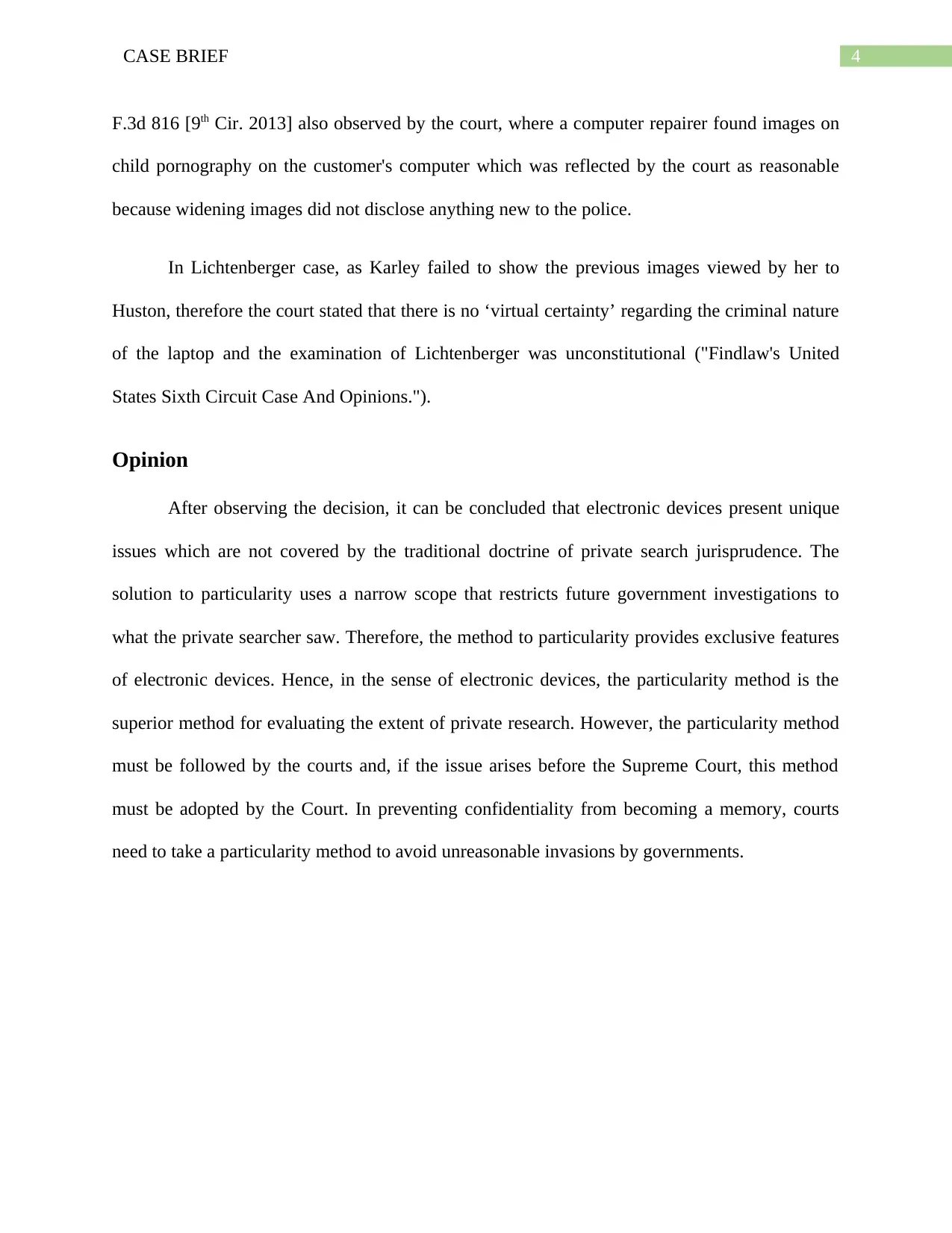
4CASE BRIEF
F.3d 816 [9th Cir. 2013] also observed by the court, where a computer repairer found images on
child pornography on the customer's computer which was reflected by the court as reasonable
because widening images did not disclose anything new to the police.
In Lichtenberger case, as Karley failed to show the previous images viewed by her to
Huston, therefore the court stated that there is no ‘virtual certainty’ regarding the criminal nature
of the laptop and the examination of Lichtenberger was unconstitutional ("Findlaw's United
States Sixth Circuit Case And Opinions.").
Opinion
After observing the decision, it can be concluded that electronic devices present unique
issues which are not covered by the traditional doctrine of private search jurisprudence. The
solution to particularity uses a narrow scope that restricts future government investigations to
what the private searcher saw. Therefore, the method to particularity provides exclusive features
of electronic devices. Hence, in the sense of electronic devices, the particularity method is the
superior method for evaluating the extent of private research. However, the particularity method
must be followed by the courts and, if the issue arises before the Supreme Court, this method
must be adopted by the Court. In preventing confidentiality from becoming a memory, courts
need to take a particularity method to avoid unreasonable invasions by governments.
F.3d 816 [9th Cir. 2013] also observed by the court, where a computer repairer found images on
child pornography on the customer's computer which was reflected by the court as reasonable
because widening images did not disclose anything new to the police.
In Lichtenberger case, as Karley failed to show the previous images viewed by her to
Huston, therefore the court stated that there is no ‘virtual certainty’ regarding the criminal nature
of the laptop and the examination of Lichtenberger was unconstitutional ("Findlaw's United
States Sixth Circuit Case And Opinions.").
Opinion
After observing the decision, it can be concluded that electronic devices present unique
issues which are not covered by the traditional doctrine of private search jurisprudence. The
solution to particularity uses a narrow scope that restricts future government investigations to
what the private searcher saw. Therefore, the method to particularity provides exclusive features
of electronic devices. Hence, in the sense of electronic devices, the particularity method is the
superior method for evaluating the extent of private research. However, the particularity method
must be followed by the courts and, if the issue arises before the Supreme Court, this method
must be adopted by the Court. In preventing confidentiality from becoming a memory, courts
need to take a particularity method to avoid unreasonable invasions by governments.
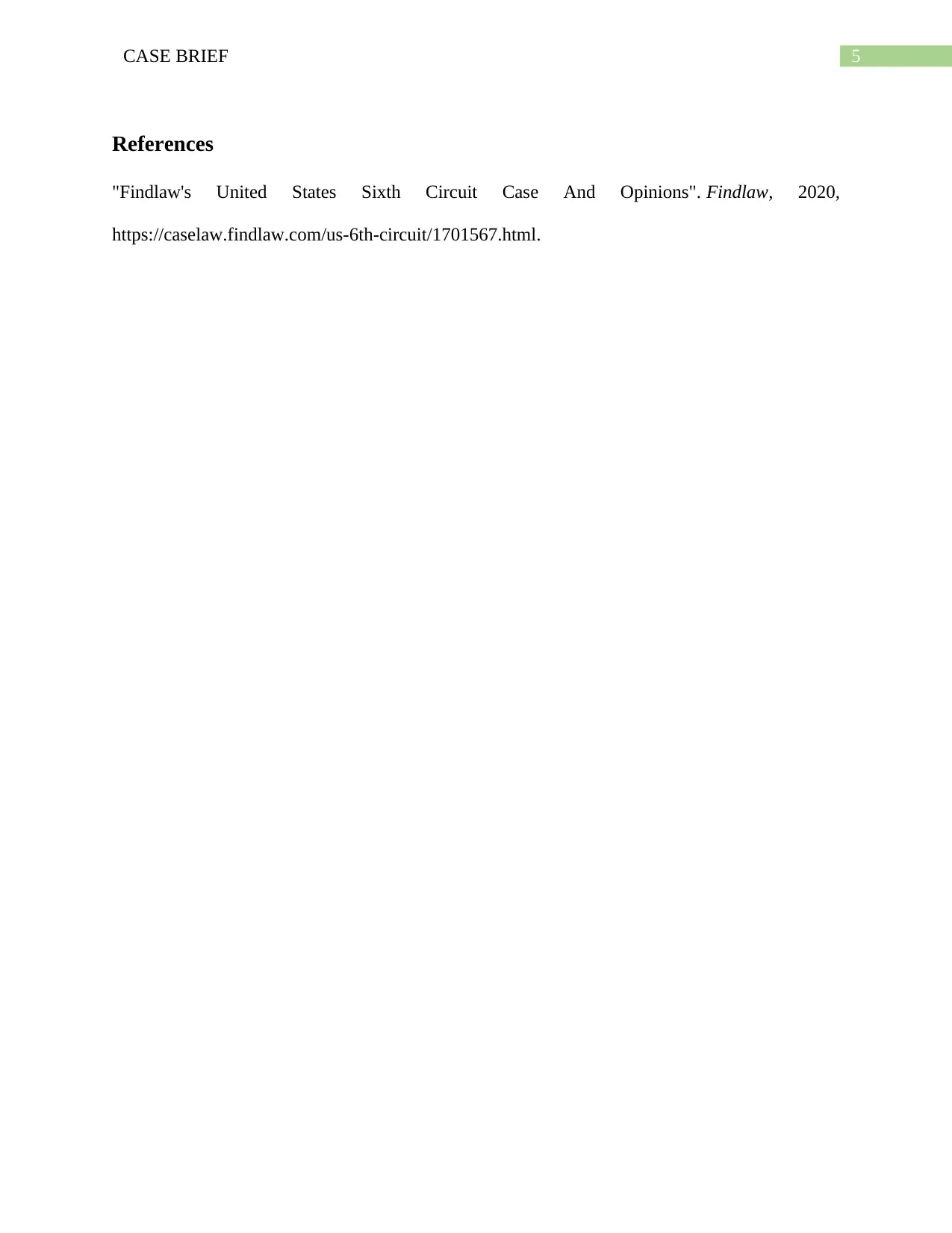
5CASE BRIEF
References
"Findlaw's United States Sixth Circuit Case And Opinions". Findlaw, 2020,
https://caselaw.findlaw.com/us-6th-circuit/1701567.html.
References
"Findlaw's United States Sixth Circuit Case And Opinions". Findlaw, 2020,
https://caselaw.findlaw.com/us-6th-circuit/1701567.html.
⊘ This is a preview!⊘
Do you want full access?
Subscribe today to unlock all pages.

Trusted by 1+ million students worldwide
1 out of 6
Your All-in-One AI-Powered Toolkit for Academic Success.
+13062052269
info@desklib.com
Available 24*7 on WhatsApp / Email
![[object Object]](/_next/static/media/star-bottom.7253800d.svg)
Unlock your academic potential
Copyright © 2020–2026 A2Z Services. All Rights Reserved. Developed and managed by ZUCOL.

